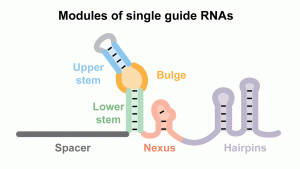 Customized genome editing – the ability to edit desired DNA sequences to add, delete, activate or suppress specific genes – has major potential for application in medicine, biotechnology, food and agriculture.
Customized genome editing – the ability to edit desired DNA sequences to add, delete, activate or suppress specific genes – has major potential for application in medicine, biotechnology, food and agriculture.
Now, in a paper published in Molecular Cell, North Carolina State University researchers and colleagues examine six key molecular elements that help drive this genome editing system, which is known as CRISPR-Cas.
NC State’s Dr. Rodolphe Barrangou, an associate professor of food, bioprocessing and nutrition sciences, and Dr. Chase Beisel, an assistant professor of chemical and biomolecular engineering, use CRISPR-Cas to take aim at certain DNA sequences in bacteria and in human cells. CRISPR stands for “clustered regularly interspaced short palindromic repeats,” and Cas is a family of genes and corresponding proteins associated with the CRISPR system that specifically target and cut DNA in a sequence-dependent manner.
Read more in the NC State News story.